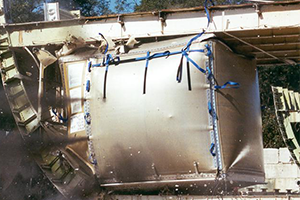ATC Helps Homeland Security Ensure Safe Flight
Matthew G. Ghent
Test Officer, Threat Detection and Systems Survivability Branch, Survivability/Lethality Directorate

Blast-resistant baggage/cargo container design test in process.
Terrorists can make explosives undetectable by all but the most intrusive searches. Aviation security is critical to our defense against terrorism. ATC works with Homeland Security to identify threats and countermeasures.
Each day, aviation security impacts millions of commercial airline passengers. Terrorism remains an ever-changing threat, and protecting the current and future fleets of commercial aircraft requires the collaboration of organizations across the country.
Since well before 9/11, ATC has supported the Commercial Aircraft Vulnerability and Mitigation Program, which is now sponsored by the Science and Technology Directorate of the Department of Homeland Security, known as DHS. The programís overarching goal is to identify the vulnerability of commercial aircraft to terrorist-based internal explosive threats and establish countermeasures against cataclysmic structural failure resulting from those threats. Testing is performed in two main areas.
Explosive Mitigation testing focuses on developing technologies to mitigate catastrophic explosive damage, such as explosive shock, blast overpressure, fragmentation and fire. ATC has performed live-fire testing on a variety of commercial aircraft blast-mitigation techniques, including blast-resistant aircraft baggage/cargo containers, explosive-resistant aircraft passenger cabin and cargo hold liners, and hardened overhead stowage bins.
Commercial Aircraft Vulnerability testing addresses the ability of commercial aircraft to survive internal explosive detonations in the passenger cabin and cargo holds. At ATC, testing is performed on both jet and full-scale aircraft. The central issue is determining the minimal size threshold for an explosive to cause immediate catastrophic aircraft loss. The test data is used to establish performance standards for the screening technologies used in airport checkpoints, upgrade future aircraft design, and develop technologies to reduce aircraft vulnerability to explosives. These improvements help to ensure that potentially disastrous terrorist acts do not result in the loss of the aircraft.
ATC also supports basic research on various types of explosives, both standard and homemade. As a Major Range and Test Facility Base, ATC provides the DHS Science and Technology Directorate with the scientific, engineering and test resources and capabilities of the DOD. Through their collaborative effort with ATC, DHS can leverage existing resources to innovate the technological tools to protect the homeland.
You are now leaving www.atc.army.mil and entering another site. You will automatically be forwarded to the target page within five seconds.
